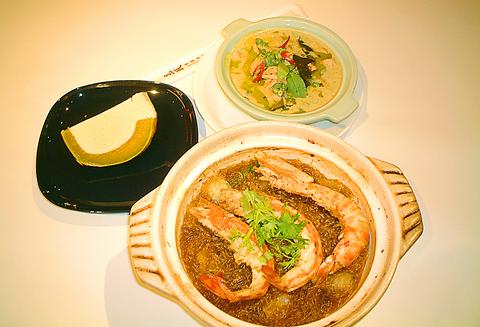One of Taipei's long-serving Thai restaurant chains, Thai Town Cuisine -- which until earlier this year went by the name Very Thai -- has been cooking up some of the tastiest and spiciest Siamese meals in the city for over six years.
Unlike the bad luck that is likely to ensure following the changing of a ship's name, the name-change and interior face-lift that saw the chain's Nanjing East Road store reopening under its new moniker earlier this year, have neither dented its reputation nor seen the restaurant flounder in anyway.

PHOTO: GAVIN PHIPPS, TAIPEI TIMES
In fact, since reopening for business in April, Thai Town Cuisine, with its new slick black-and-red interior, has experienced quite the opposite after-effect. Patronage has continued to increase and looks set to continue to do so for the unforeseeable future.
The secret of its success, according to marketing supervisor Jean Lin (林宜靜), lays not only with the quality of the food served at Thai Town Cuisine, but is also heavily influenced by management's tenacity for consistency. Whether you choose to chow down at the chain's Tienmou branch or its Yongho branch, the food that will arrive at your table will be equally scrumptious, regardless of the social environment of the neighborhood you opt to dine in. "It's often difficult when you run a chain store to maintain a constant level of quality," explained Lin. "With one restaurant, it's easy to keep a good reputation, but, more often than not, when restaurants expand it all goes downhill." To ensure Thai Town Cuisine doesn't join the long list of establishments that have branched out, but failed to keep them coming back for more, management keeps an eye on its kitchens and what takes place within them. Much of what appears on the menu certainly won't come as a surprise to lovers of traditional Siamese fare. The uniform quality of the product, however, is worth noting. The menu is packed with all the standard Thai dishes such as curry crab (NT$450), sweet and sour cod Thai-style (NT$300), king pawn vermicelli (NT$450), spicy beef and cashew nuts (NT280) and coconut beef curry (NT$280) to name but a few. Along with the usual suspects, Thai Town does throw a few original dishes in the diner's direction. Finding dishes such as the red curry with vegetables and fruit (NT$180), deep-fried sea bass with tamarind and chili (NT$450), spicy octopus with cashew nuts (NT$300) and roasted pork with lemon sauce (NT$280) on the menu makes for a pleasant and certainly tasty change. The thing that really sets Thai Town Cuisine apart from its many peers, however, is the manner in which the chefs ensure each dish fires a chili-loaded salvo. Whatever you choose to dine on, it's guaranteed that it will contain a whole heap of chili and garlic. As well as Thai Town Cuisine's Yongho, Nanjing East Road and Tienmou branches, fans of Thai food who call Panchiao and Sanchung home can also experience the chain's appetizing Thai food.

On Jan. 17, Beijing announced that it would allow residents of Shanghai and Fujian Province to visit Taiwan. The two sides are still working out the details. President William Lai (賴清德) has been promoting cross-strait tourism, perhaps to soften the People’s Republic of China’s (PRC) attitudes, perhaps as a sop to international and local opinion leaders. Likely the latter, since many observers understand that the twin drivers of cross-strait tourism — the belief that Chinese tourists will bring money into Taiwan, and the belief that tourism will create better relations — are both false. CHINESE TOURISM PIPE DREAM Back in July

Could Taiwan’s democracy be at risk? There is a lot of apocalyptic commentary right now suggesting that this is the case, but it is always a conspiracy by the other guys — our side is firmly on the side of protecting democracy and always has been, unlike them! The situation is nowhere near that bleak — yet. The concern is that the power struggle between the opposition Chinese Nationalist Party (KMT) and their now effectively pan-blue allies the Taiwan People’s Party (TPP) and the ruling Democratic Progressive Party (DPP) intensifies to the point where democratic functions start to break down. Both

Taiwan doesn’t have a lot of railways, but its network has plenty of history. The government-owned entity that last year became the Taiwan Railway Corp (TRC) has been operating trains since 1891. During the 1895-1945 period of Japanese rule, the colonial government made huge investments in rail infrastructure. The northern port city of Keelung was connected to Kaohsiung in the south. New lines appeared in Pingtung, Yilan and the Hualien-Taitung region. Railway enthusiasts exploring Taiwan will find plenty to amuse themselves. Taipei will soon gain its second rail-themed museum. Elsewhere there’s a number of endearing branch lines and rolling-stock collections, some

This was not supposed to be an election year. The local media is billing it as the “2025 great recall era” (2025大罷免時代) or the “2025 great recall wave” (2025大罷免潮), with many now just shortening it to “great recall.” As of this writing the number of campaigns that have submitted the requisite one percent of eligible voters signatures in legislative districts is 51 — 35 targeting Chinese Nationalist Party (KMT) caucus lawmakers and 16 targeting Democratic Progressive Party (DPP) lawmakers. The pan-green side has more as they started earlier. Many recall campaigns are billing themselves as “Winter Bluebirds” after the “Bluebird Action”